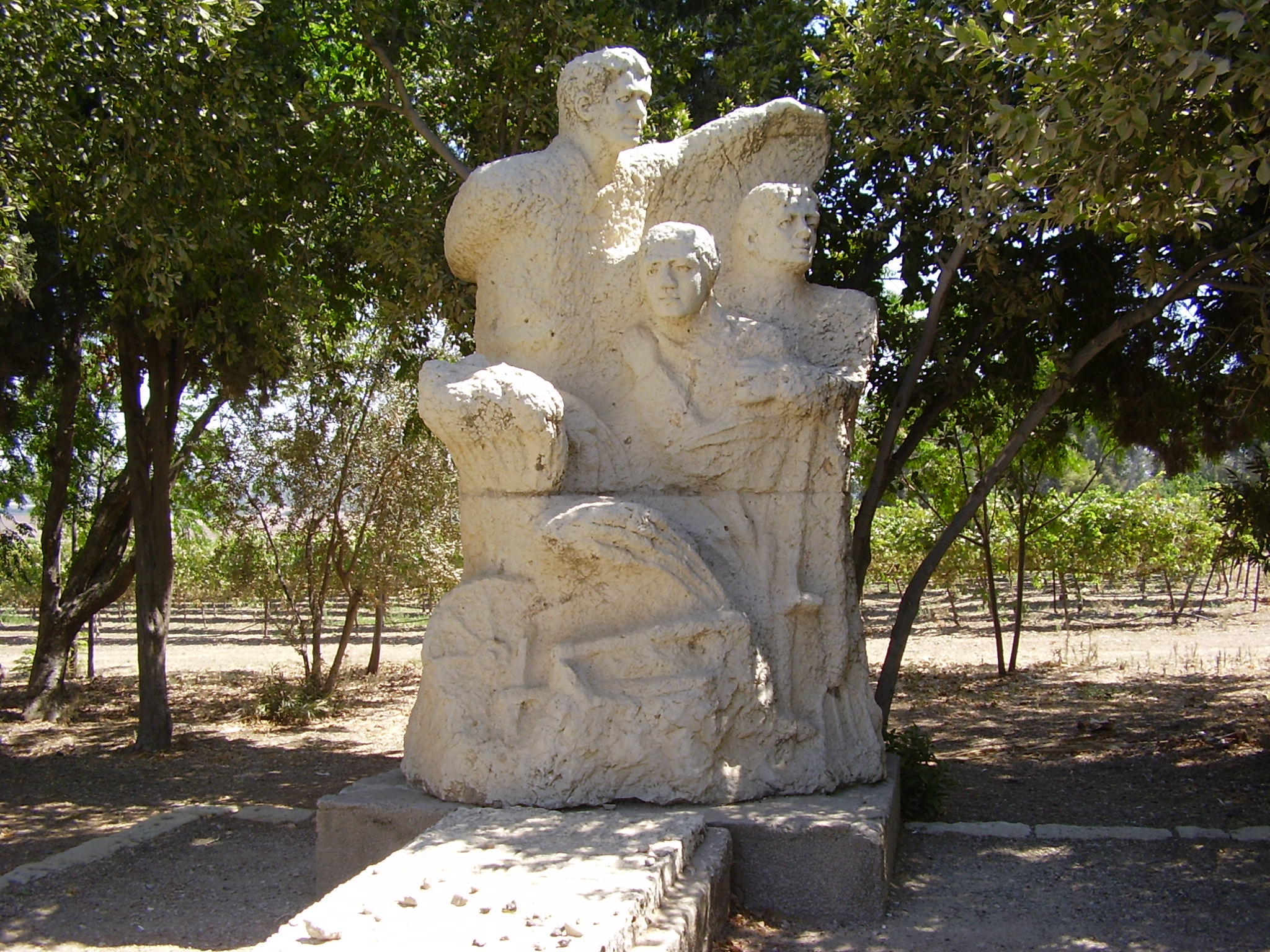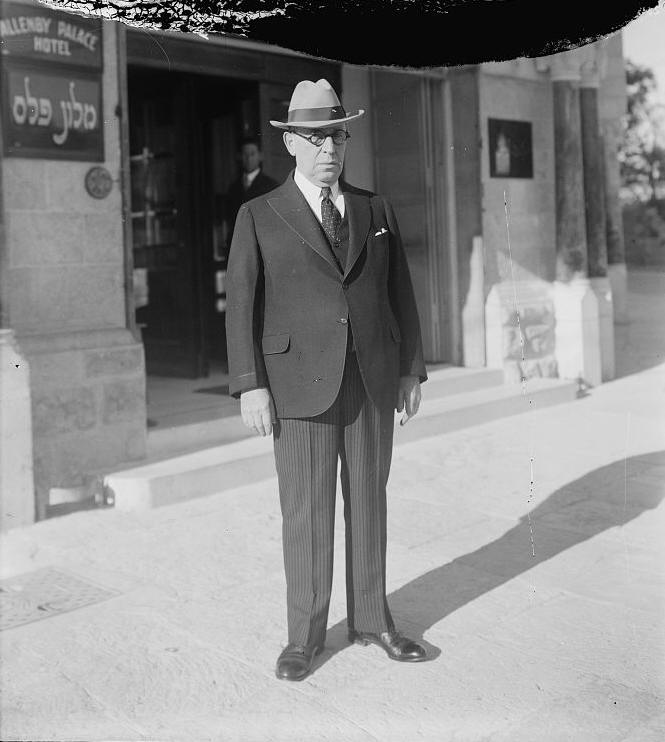|
Hulda, Israel
Hulda ( he, חֻלְדָּה) is a kibbutz in central Israel. Located in the Shephelah near the Hulda Forest and the Burma Road, it falls under the jurisdiction of Gezer Regional Council. In it had a population of . Etymology The kibbutz takes its name from the Palestinian village of Khulda, which existed nearby until the 1948 Arab–Israeli War. History Ottoman rule In 1905, the Anglo Palestine Bank purchased of land from the Saidun tribe for a Jewish settlement near the Jaffa–Jerusalem railway. Ownership of the land was transferred to the Jewish National Fund which turned it over to the Palestine Office of the Zionist Organization (ZO). In 1909, the Hulda farm was established and a building (today Herzl House) was constructed to house the manager of the farm and was later used by the kibbutz members. British Mandate Groups of pioneers who trained at the Hulda farm helped establish Ein Harod (1921), Kfar Yehezkel (1921), Ginegar (1922) and other kibbutzim. According to ... [...More Info...] [...Related Items...] OR: [Wikipedia] [Google] [Baidu] |
Gordonia (youth Movement)
Gordonia ( he, גורדוניה) was a Zionist youth movement. The movement's doctrines were based on the beliefs of Aaron David Gordon, i.e. the redemption of Eretz Yisrael and the Jewish People through manual labor and the revival of the Hebrew language. In Gordonia the cadets learned Hebrew and the graduates organized themselves into training groups pending aliyah to the Holy Land. History Founded in 1925 in Poland, Jewish Virtual Library the movement promoted aliyah to kibbutzim in during the |
Kfar Yehezkel
Kfar Yehezkel ( he, כְּפַר יְחֶזְקֵאל, ''lit.'' Yehezkel Village) is a moshav ovdim in northern Israel. Located in the Jezreel Valley, six kilometres southeast of Afula, it falls under the jurisdiction of Gilboa Regional Council. In the moshav had a population of . History Kfar Yehezkel was founded on 16 December 1921 by pioneers of the Second Aliyah.Family Affair: The Broidas, Kfar Yehezkel Haaretz, 16 April 2009 Settlers from and , which was evacuated because of Arab attacks from Lebanon, were also among the founding members. It was the sec ... [...More Info...] [...Related Items...] OR: [Wikipedia] [Google] [Baidu] |
Shabtai Teveth
Shabtai Teveth (1925 – 1 November 2014) was an Israeli historian and author. Teveth was born in 1925 and grew up in the worker' quarters at the Migdal Tzedek quarry, where his father worked, near Petah Tikva. He began working as a journalist for the newspaper ''Haaretz'' in 1950, eventually becoming its political correspondent. In 1981, he was appointed senior research fellow at the Moshe Dayan Center for Middle Eastern and African Studies at Tel Aviv University. Following the publication of his research into the murder of Haim Arlosoroff, 1982, Menachim Begin - first Israeli Prime Minister elected from the Revisionist movement - ordered a Judicial Commission of Enquiry which concluded that Teveth was wrong to suggest the murder might have been carried out by two Revisionists. In his biography of David Ben-Gurion, Teveth argues that Ben-Gurion did not instigate a policy of population transfer. In 2005, Teveth was awarded the Israel Prize for "lifetime achievement and special ... [...More Info...] [...Related Items...] OR: [Wikipedia] [Google] [Baidu] |
Jerusalem
Jerusalem (; he, יְרוּשָׁלַיִם ; ar, القُدس ) (combining the Biblical and common usage Arabic names); grc, Ἱερουσαλήμ/Ἰεροσόλυμα, Hierousalḗm/Hierosóluma; hy, Երուսաղեմ, Erusałēm. is a city in Western Asia. Situated on a plateau in the Judaean Mountains between the Mediterranean Sea, Mediterranean and the Dead Sea, it is one of the List of oldest continuously inhabited cities, oldest cities in the world and is considered to be a holy city for the three major Abrahamic religions: Judaism, Christianity, and Islam. Both Israelis and Palestinians claim Jerusalem as their Capital city, capital, as Israel maintains its primary governmental institutions there and the State of Palestine ultimately foresees it as its seat of power. Because of this dispute, Status of Jerusalem, neither claim is widely recognized internationally. Throughout History of Jerusalem, its long history, Jerusalem has been destroyed at least twice, Sie ... [...More Info...] [...Related Items...] OR: [Wikipedia] [Google] [Baidu] |
Battle For Jerusalem
The Battle for Jerusalem took place during the 1947–1948 civil war phase of the 1947–1949 Palestine war. It saw Jewish and Arab militias in Mandatory Palestine, and later the militaries of Israel and Transjordan, fight for control over the city of Jerusalem. Under the 1947 United Nations Partition Plan for Palestine, Jerusalem was to be a ''corpus separatum'' () administered by an international body. Fighting nevertheless immediately broke out in the city between Jewish and Arab militias, with bombings and other attacks being carried out by both sides. Beginning in February 1948, Arab militias under Abd al-Qadir al-Husayni blockaded the corridor from Tel Aviv to Jerusalem, preventing essential supplies from reaching the Jewish population. This blockade was broken in mid-April of that year by Jewish militias who carried out Operation Nachshon and Operation Maccabi. On 14 May and the following days, the Etzioni and Harel brigades, supported by Irgun troops, launched s ... [...More Info...] [...Related Items...] OR: [Wikipedia] [Google] [Baidu] |
Yiftach Brigade
The Yiftach Brigade (also known as the Yiftah Brigade, the 11th Brigade in the 1948 Arab–Israeli War) was an Israeli infantry brigade. It included two Palmach battalions (the 1st and 7th), and later also the 2nd, which was transferred from the Negev Brigade. The Palmach memorial website records 274 of its members being killed whilst in the Yiftach Brigade. File:Moshe Kelman ii.jpg, Moshe Kelman, commander during Operation Yiftach File:Mula Cohen.jpg, Mula Cohen, commander during Operation Danny File:Gideon Eilat.jpg, Gideon Eilat commander during Operation Yoav Military operations The Yiftach Brigade participated in the following Israeli military operations: * Operation Yiftach * Operation Yoram * Operation Danny * Operation Yoav * Metzudat Koach Memorial The memorial for the fallen soldiers of the Yiftach Brigade is situated in the northern Negev north of Rahat, near Kibbutz Beit Kama and Kama Junction on Road 40. See also * List of battles and operations in the 1 ... [...More Info...] [...Related Items...] OR: [Wikipedia] [Google] [Baidu] |
Palmach
The Palmach (Hebrew: , acronym for , ''Plugot Maḥatz'', "Strike Companies") was the elite fighting force of the Haganah, the underground army of the Yishuv (Jewish community) during the period of the British Mandate for Palestine. The Palmach was established on 15 May 1941. By the outbreak of the 1948 Arab–Israeli War it consisted of over 2,000 men and women in three fighting brigades and auxiliary aerial, naval and intelligence units. With the creation of Israel's army, the three Palmach Brigades were disbanded. This and political reasons compelled many of the senior Palmach officers to resign in 1950. The Palmach contributed significantly to Israeli culture and ethos, well beyond its military contribution. Its members formed the backbone of the Israel Defense Forces high command for many years, and were prominent in Israeli politics, literature and culture. History The Palmach was established by the Haganah High Command on 14 May 1941. Its aim was to defend the Palestin ... [...More Info...] [...Related Items...] OR: [Wikipedia] [Google] [Baidu] |
Mansura 1945
Mansoura (' , rural: ) is a city in Egypt, with a population of 960,423. It is the capital of the Dakahlia Governorate. Etymology ''Mansoura'' in Arabic means "victorious". The city is named after the El Mansoura Battle against Louis IX of France during the Seventh Crusade. History Mansoura was established in 1219 by al-Kamil of the Ayyubid dynasty upon a Phatmetic branch of the Nile on a place of several older villages like Al-Bishtamir () and Kafr al-Badamas (, from , "river,canal"). After the Egyptians defeated the Crusaders during the Seventh Crusade, it was named ''Mansoura'' (aka. "The Victorious"). In the Seventh Crusade, the Capetians were defeated and put to flight; between fifteen and thirty thousand of their men fell on the battlefield. Louis IX of France was captured in the main Battle of Fariskur, and confined in the house of Ibrahim Ibn Lokman, secretary of the sultan, and under the guard of the eunuch Sobih. The king's brother was imprisoned in the same ho ... [...More Info...] [...Related Items...] OR: [Wikipedia] [Google] [Baidu] |
Hulda 1942 , a character in Germanic folklore
{{Disambiguation ...
Hulda may refer to: People * Hulda (given name) * Hulda (poet), Icelandic poet * Huldah, Biblical prophetess Other uses * '' Hulda'', a genus of moth * ''Hulda'' (opera), by César Franck * Hulda, Israel, a kibbutz in Israel * '' Hulda-Hrokkinskinna'', an Icelandic manuscript * Mother Hulda, a German folk tale * Holda "Frau Holle" ( ; also known as "Mother Holle", "Mother Hulda" or "Old Mother Frost") is a German fairy tale collected by the Brothers Grimm in ''Children's and Household Tales'' in 1812 (KHM 24). It is of Aarne-Thompson type 480. Frau Holle (als ... [...More Info...] [...Related Items...] OR: [Wikipedia] [Google] [Baidu] |
1936–1939 Arab Revolt In Palestine
The 1936–1939 Arab revolt in Palestine, later known as The Great Revolt (''al-Thawra al- Kubra'') or The Great Palestinian Revolt (''Thawrat Filastin al-Kubra''), was a popular nationalist uprising by Palestinian Arabs in Mandatory Palestine against the British administration of the Palestine Mandate, demanding Arab independence and the end of the policy of open-ended Jewish immigration and land purchases with the stated goal of establishing a "Jewish National Home". The uprising coincided with a peak in the influx of immigrant Jews, some 60,000 that year –the Jewish population having grown under British auspices from 57,000 to 320,000 in 1935 – and with the growing plight of the rural fellahin rendered landless, who as they moved to metropolitan centers to escape their abject poverty found themselves socially marginalized. Since 1920 Jews and Arabs had been involved in a cycle of attacks and counter-attacks, and the immediate spark for the uprising was the murder of two Jew ... [...More Info...] [...Related Items...] OR: [Wikipedia] [Google] [Baidu] |
Haganah
Haganah ( he, הַהֲגָנָה, lit. ''The Defence'') was the main Zionist paramilitary organization of the Jewish population ("Yishuv") in Mandatory Palestine between 1920 and its disestablishment in 1948, when it became the core of the Israel Defense Forces (IDF). Formed out of previous existing militias, its original purpose was to defend Jewish settlements from Arab attacks, such as the riots of 1920, 1921, 1929 and during the 1936–1939 Arab revolt in Palestine. It was under the control of the Jewish Agency, the official governmental body in charge of Palestine's Jewish community during the British Mandate. Until the end of the Second World War, Haganah's activities were moderate, in accordance with the policy of havlaga ("self-restraint"), which caused the splitting of the more radical Irgun and Lehi. The group received clandestine military support from Poland. Haganah sought cooperation with the British in the event of an Axis invasion of Palestine through N ... [...More Info...] [...Related Items...] OR: [Wikipedia] [Google] [Baidu] |
1929 Palestine Riots
The 1929 Palestine riots, Buraq Uprising ( ar, ثورة البراق, ) or the Events of 1929 ( he, מאורעות תרפ"ט, , ''lit.'' Events of 5689 Anno Mundi), was a series of demonstrations and riots in late August 1929 in which a longstanding dispute between Muslims and Jews over access to the Western Wall in Jerusalem escalated into violence. The riots took the form, for the most part, of attacks by Arabs on Jews accompanied by destruction of Jewish property. During the week of riots, from 23 to 29 August, 133 Jews were killed by Arabs, and 339 Jews were injured, most of whom were unarmed. There were 116 Arabs killed and at least 232 wounded, mostly by the Mandate police suppressing the riots. Around 20 Arabs were killed by Jewish attackers and indiscriminate British gunfire. After the riots, 174 Arabs and 109 Jews were charged with murder or attempted murder; around 40% of Arabs and 3% of Jews were subsequently convicted. During the riots, 17 Jewish communities were e ... [...More Info...] [...Related Items...] OR: [Wikipedia] [Google] [Baidu] |


